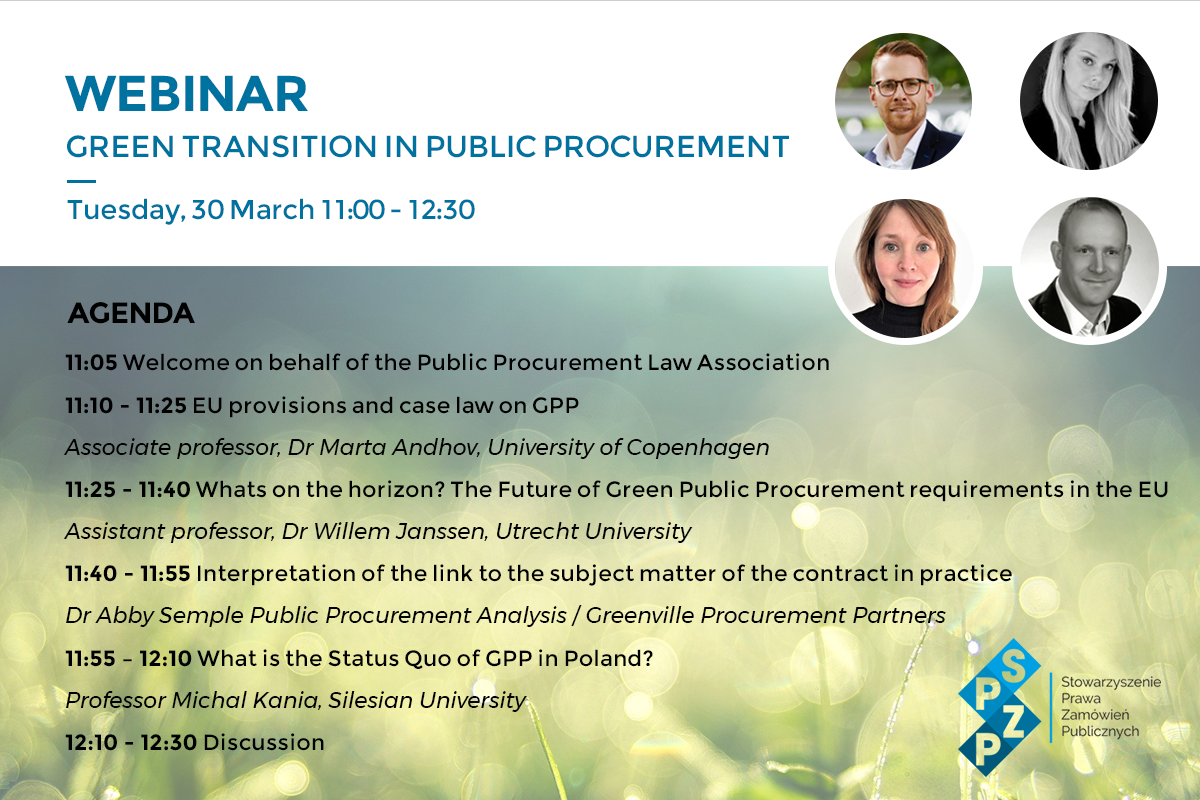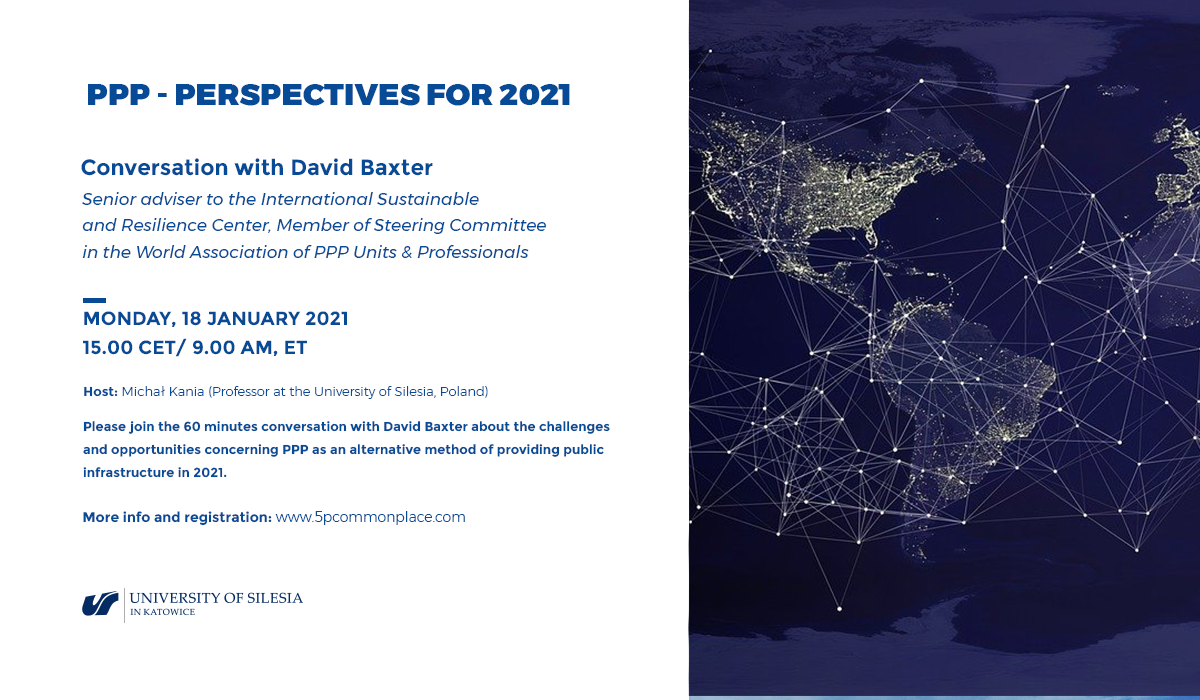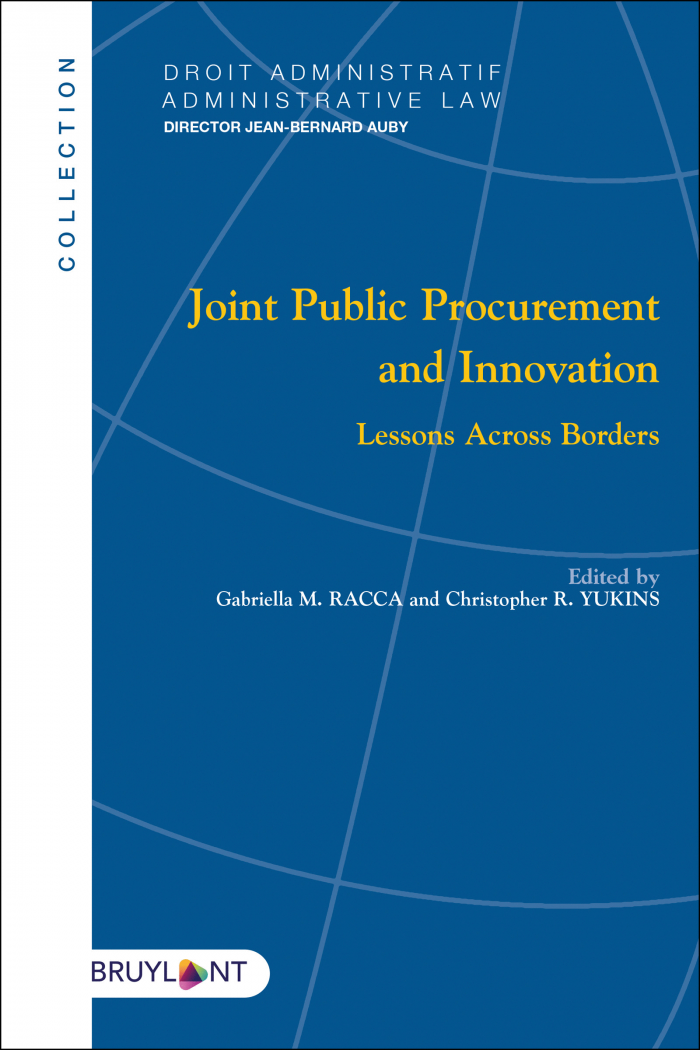Webinar: Green Transition in Public Procurement

On Tuesday, March 30 I had the chance to participate in the webinar concerning Green Transition in public procurement with great speakers: professor Marta Andhov (U. Copenhagen), dr Abbey Sample (Public Procurement Analysis / Greenville Procurement Partners) and professor Willem A. Janssen (U. Utrecht).
PPP-Perspectives for 2021 Conversation with David Baxter

On Monday, January 18 I had the great opportunity to talk with David Baxter about the Public - Private Partnerships perspectives for 2021. We discussed issues related to the PPP role under President Joe Biden's administration, IMAGO and People First PPP inintiatives, challenges related to digitalization of the public infrastructure, lessons learned for PPP after Covid-19 pandemic and more.
Webinar: Current Challenges and Opportunities for Green Public Procurement
On Wednesday, September 30 I had the great chance to moderate the webinar: Current Challenges and Opportunities for Green Public Procurement. Among panelists: prof. Jerzy Buzek (MEP), prof. Alexandra Harrington (U.Albany), adv. Magdalena Stryja (U.Silesia), prof. Christopher Yukins (GWU), adv. Katarzyna Kuźma (DZP) and dr Wojciech Hartung (DZP). We discussed the influence of the Paris Agreement, New European Green Deal and the Just Transition Mechanism on public procurement policies and regulation.
This event has been organized by the Institute of Law at the University of Silesia, Association ''Pro Silesia’’ with the support of the George Washington University’s Government Procurement Program.
Webinar: Public procurement in times of Covid-19. Global experiences, challenges and further steps. Conversation with professor Christopher Yukins.

On Friday, June 5 I had the great chance to talk with professor Christopher Yukins (George Washington University) during the webinar: ''Public procurement in times of Covid-19. Global experiences, challenges and further steps''.
Among others we discussed the issues related to changes of the public procurement market in the time of the COVID-19 pandemic, general challenges to public procurement during this dramatic time, reactions to these challenges on the public buyers’ side, the role of public procurement regulation in the context of the Guidance from the European Commission on using the public procurement framework in the emergency situation related to the COVID-19 crisis (2020/C 108 I/01) and it's implication for the future. Also the importance of the E-public procurement has been pointed out.
With the kind participation of professor Gabriella Racca (University of Turin) we also talked about the role of innovation in public procurement. Professor Racca is the co-editor, together with professor Yukins of the book:''Joint Public Procurement and Innovation. Lessons Accross Borders''.
Available online at https://www.larcier.com/fr/joint-public-procurement-and-innovation-2019-9782802763802.html

Guidance from the European Commission on using the public procurement framework in the emergency situation related to the COVID-19 crisis (2020/C 108 I/01)

European Commission issued today Guidance on using the public procurement framework in the emergency situation related to the COVID-19 crisis (2020/C 108 I/01)
https://eur-lex.europa.eu/legal-content/EN/TXT/?uri=OJ:C:2020:108I:FULL
The Commission underlines that COVID-19 is a health crisis that requires swift and smart solutions and agility in dealing with an immense increase of demand for similar goods and services while certain supply chains are disrupted. Public buyers in the Member States are at the forefront for most of these goods and services. They have to ensure the availability of personal protective equipment such as face masks and protective gloves, medical devices, notably ventilators, other medical supplies, but also hospital and IT infrastructure, to name only a few. It has been also raised that at European level, the Commission together with the Member States has already stepped up efforts by launching joint procurement actions for various medical supplies.
At the same time it has been mentioned by the Commission that public buyers can rely on the EU public procurement framework, which provides ways and means to accommodate severe emergencies such as the COVID-19 pandemic.
In the opinion of the European Commission public buyers have several options they can consider.
Firstly, in cases of urgency they can avail themselves of possibilities to substantially reduce the deadlines to accelerate open or restricted procedures.
For open procedures subject to the Directive, a deadline of 35 days for the submission of tenders applies. In the case of restricted procedures, the Directive foresees a deadline of 30 days for the submission of requests to participate followed by an additional deadline of 30 days for the presentation of tenders. This last deadline may, where the national legislation has implemented this option, be agreed between sub-central contracting authorities, such as regional or local authorities, and the participants.
If an agreement cannot be reached, then a minimum deadline of 10 days may be applied. In addition, in both open and restricted procedures, these deadlines may be shortened: (1) either in case of a prior information notice not used as a means of calling for competition, but which included all the information required for the contract notice in Section I of Part B of Annex V and was sent for publication between 35 days and 12 months before the date on which the contract notice was sent; (2) or in case of urgency duly substantiated by the contracting authority and that renders impracticable the applicable time limit. If urgency requires it, the Directive 2014/24/EU of the European Parliament and of the Council of 26 February 2014 on public procurement and repealing Directive 2004/18/EC foresees a substantial reduction of the general deadlines: under the open procedure, the deadline for the submission of tenders may be reduced to 15 days in cases of duly justified urgency; under the restricted procedure, the deadline to submit a request for participation may be reduced to 15 days and to submit an offer to 10 days. This allows for a speedy award of the contract.
Secondly, if those flexibilities are not sufficient, a negotiated procedure without publication can be envisaged. With the ''negotiated procedure without publication'', Union law provides an additional tool, which will allow for a faster awarding of contracts to provide for COVID-19 pandemic related needs. In accordance with Article 32(2)(c) of the Directive 2014/24/EU contracting authorities may award public contracts by a negotiated procedure without publication ''insofar as is strictly necessary where, for reasons of extreme urgency brought about by events unforeseeable by the contracting authority, the time limits for the open or restricted procedures or competitive procedures with negotiation cannot be complied with. The circumstances invoked to justify extreme urgency shall not in any event be attributable to the contracting authority''. Commission recalls that, as contracting authorities derogate in this case from the basic principle of the Treaty concerning transparency, the European Court of Justice requires that the use of this procedure remains exceptional. All the conditions have to be met cumulatively and are to be interpreted restrictively (see, for instance cases C-275/08, Commission v Germany, and C-352/12, Consiglio Nazionale degli Ingegneri).
Eventually, even a direct award to a preselected economic operator could be allowed, provided the latter is the only one able to deliver the required supplies within the technical and time constraints imposed by the extreme urgency.
Finally, public buyers should also consider looking at alternative solutions and engaging with the market. To satisfy their needs, public buyers may have to look for alternative and possibly innovative solutions, which might already be available on the market or could be capable of being deployed at (very) short notice. Public buyers will have to identify solutions and interact with potential suppliers in order to assess whether these alternatives meet their needs.
Public buyers are fully empowered under the EU framework to engage with the market and in matchmaking activities. There are various ways to interact with the market to stimulate the supply and for the medium term needs, the application of urgent procedures could prove a more reliable means of getting better value for money and wider access to available supplies. In addition: public buyers may use innovative digital tools to trigger a wide interest among economic actors able to propose alternative solutions. For example, they could launch hackathons for new concepts that enable reusing protective masks after cleaning, for ideas on how to protect medical staff effectively, for ways to detect the virus in the environment, etc. Public buyers may also work more closely with innovation ecosystems or entrepreneurs’ networks, which could propose solutions.